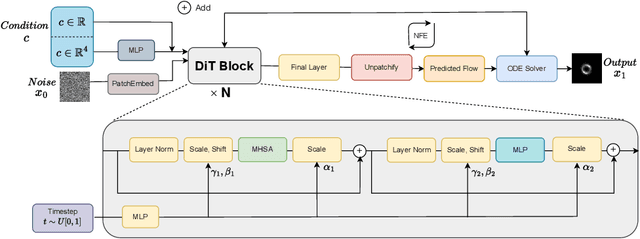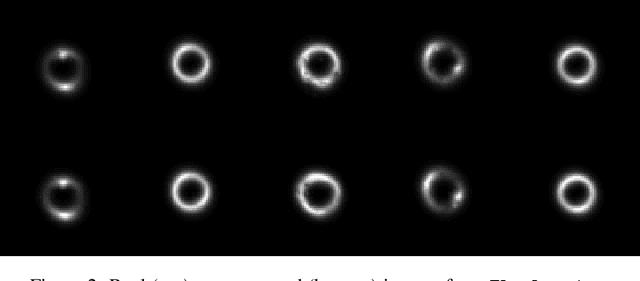Pranath Reddy
FlowLensing: Simulating Gravitational Lensing with Flow Matching
Oct 09, 2025



Abstract:Gravitational lensing is one of the most powerful probes of dark matter, yet creating high-fidelity lensed images at scale remains a bottleneck. Existing tools rely on ray-tracing or forward-modeling pipelines that, while precise, are prohibitively slow. We introduce FlowLensing, a Diffusion Transformer-based compact and efficient flow-matching model for strong gravitational lensing simulation. FlowLensing operates in both discrete and continuous regimes, handling classes such as different dark matter models as well as continuous model parameters ensuring physical consistency. By enabling scalable simulations, our model can advance dark matter studies, specifically for probing dark matter substructure in cosmological surveys. We find that our model achieves a speedup of over 200$\times$ compared to classical simulators for intensive dark matter models, with high fidelity and low inference latency. FlowLensing enables rapid, scalable, and physically consistent image synthesis, offering a practical alternative to traditional forward-modeling pipelines.
Application of Unsupervised Domain Adaptation for Structural MRI Analysis
Dec 26, 2022Abstract:The primary goal of this work is to study the effectiveness of an unsupervised domain adaptation approach for various applications such as binary classification and anomaly detection in the context of Alzheimer's disease (AD) detection for the OASIS datasets. We also explore image reconstruction and image synthesis for analyzing and generating 3D structural MRI data to establish performance benchmarks for anomaly detection. We successfully demonstrate that domain adaptation improves the performance of AD detection when implemented in both supervised and unsupervised settings. Additionally, the proposed methodology achieves state-of-the-art performance for binary classification on the OASIS-1 dataset.
CMB-GAN: Fast Simulations of Cosmic Microwave background anisotropy maps using Deep Learning
Aug 11, 2019



Abstract:Cosmic Microwave Background (CMB) has been a cornerstone in many cosmology experiments and studies since it was discovered back in 1964. Traditional computational models like CAMB that are used for generating CMB anisotropy maps are extremely resource intensive and act as a bottleneck in cosmology experiments that require a large amount of CMB data for analysis. In this paper, we present a new approach to the generation of CMB anisotropy maps using a machine learning technique called Generative Adversarial Network (GAN). We train our deep generative model to learn the complex distribution of CMB maps and efficiently generate new sets of CMB data in the form of 2D patches of anisotropy maps. We limit our experiment to the generation of 56{\deg} and 112{\deg} patches of CMB maps. We have also trained a Multilayer perceptron model for estimation of baryon density from a CMB map, we will be using this model for the performance evaluation of our generative model using diagnostic measures like Histogram of pixel intensities, the standard deviation of pixel intensity distribution, Power Spectrum, Cross power spectrum, Correlation matrix of the power spectrum and Peak count.
 Add to Chrome
Add to Chrome Add to Firefox
Add to Firefox Add to Edge
Add to Edge